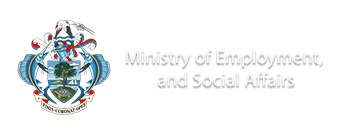‘Prepare for work programme’ through soft skills for re-skilling and up-skilling A journey of change for a group of former substance abusers
It is a known fact that many people have moved on to lead successful lives and take up careers they enjoy after rehabilitation, while, in addition, many companies today are open to hiring candidates with previous drug or alcohol issues.
With the goal of promoting that culture, the employment department, along with two of its partners, namely the Guy Morel Institute (TGMI) and the division of substance abuse prevention treatment and rehabilitation (DSAPTR) has started a ‘Prepare for work programme’ – soft skills for reskilling and upskilling for former substance abusers.
Upskilling is the process of learning new skills or of teaching workers new skills, while reskilling is the process of learning new skills so you can do a different job, or of training people to do a different job.
The first group of 11 former substance abusers received their certificates on Tuesday afternoon after successfully completing the five-day training which aims at transforming their mindsets by exploring three main topics ‒ including personal leadership, mind-set change and vision and career change.
The newly-acquired skills will also enable them to better navigate the world and also to make use of it in their personal life.
The certificate presentation ceremony which took place at the TGMI at Ma Joie was attended by the Minister of Employment and Social Affairs Patricia Francourt, principal secretary for health Dr Bernard Valentin, acting executive director of TGMI Patrick Bristol, among other guests.
Addressing the participants, Minister Francourt, firstly, commended them for the effort and first step taken in their journey to employment despite their struggle, based on their substance abuse history.
She explained that their moves show that they are willing to adjust to normal life again while re-entering the workforce can help them as individuals to recover in so many ways, since a new job gives a person in recovery a newfound sense of purpose and responsibility.
She explained to them that even if life during and after recovery may seem like an uphill battle at times, in the end, a healthy, happy and substance-free life will be well worth the journey.
Minister Francourt further added that since the beginning of the training programme, she had been in regular contact with the facilitators and staff, keeping a close eye on the progress and that she was delighted each time to receive a positive comment.
She noted that based on the ongoing transformation, Seychelles as a country is in need, more than ever of all its healthy citizens who are determined and willing to play a part in its development.
The employment and social affairs minister pledged her support for the group and reassured them that she has great hope in them, similar to other partners, like local companies that believe in giving second chances, and are willing to take them on board.
She also urged others who have fell victims to substance addiction and are willing to make a positive change in their lives to come forward and join the programme.
On behalf of the Ministry of Health, precisely the DSAPTR, Dr Valentin noted that the most remarkable thing that he got from the participants is that during the week, they have learned to respect themselves and other people, and also how to properly behave in everyday life.
All these, he said, are very important criteria which lead to an exemplary and respectful citizen within the society, and by learning these, the participants are on the good path towards recovery and re-adjustment within the society, especially integrating the world of work.
By Roland Duval



